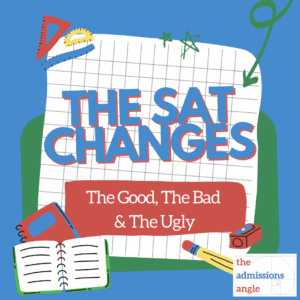
Tips for Cutting College Essays
You’ve spent months brainstorming, drafting, editing, and pouring your heart into your college admissions essays. And now, no matter how hard you try, you can’t seem to cut it down to the correct length. Sound familiar? Here are some tips for cutting college essays.

By NOELLE COMPTON
When it comes to college essays, word counts can be quite the headache. 650-words isn’t very much space to draft a compelling main essay, and yet that is all you’re offered. Meanwhile, other schools have varying degrees of insanely small limits, from 50-word short answers to 150-word mini-essays. Oftentimes, students come to us with panic in their eyes and expressions of, “no matter how I try, I cannot cut one more word.” The reasons for this are many. Maybe you are married to the work. Or perhaps your brain is just fried from so much writing. In any case, cutting college essays can be almost as tedious as writing them in the first place, and for that, please enjoy the following tips.
“College consulting is not only for the Ivy League-bound.”
Tip #1: Get out your highlighter
When I was in Freshman Honors English as a young student, my teacher had us complete the following exercise before handing in our essays: In one color, highlight any thesis statements or transitions. In another color, highlight textual evidence. And in a third color, highlight analysis. At the end, whatever is not highlighted is fluff, so cut it. Writing college essays is not the same as literary analysis, but we can adopt similar principles.
For a “why” essay, highlight thesis statements and transitions. Then, highlight sentences containing specific examples related to the school or field of study, such names of professors and departments, clubs, etc. And finally, highlight sentences that are demonstrating your own experiences, such as subjects you’ve already studied or activities that you’ve already engaged in. Now, have a look at what is left over. Do you need it, or is it filler?
For a Common App essay, this is a bit trickier. With your first color, I suggest highlighting “need to know” information. Which elements are essential to understanding the plot of your story? These items might include sentences that offer context, the statement of problem, or the lesson learned. Then, I would highlight sentences that give information about who you are– those small details that bring vibrancy to your story. And finally, I would highlight “showing” sentences. That is, sentences that are rich in detail and demonstrate an action. In the end, your highlighted sections will be essential, valuable details, and colorful descriptions. If it isn’t highlighted, what is it doing there?

Tip #2: Search for repetition
Repetitious sentences are the first thing I look for when deciding what to cut. Here is an example of how this might look:
“I have always loved working with people. From small problems like learning how to calculate slope to bigger problems like poverty, helping others is my motivating interest.”
If I were editing this “why” essay, I would cut the first sentence. Why? Everything that is stated in the first sentence can be understood in the second sentence. Sure, there might be some who hate working with people but still enjoy helping others, but your admissions officer is not trying to split hairs. Give them enough credit, and assume they can figure it out.
Another place where repetition shows up is at the end of paragraphs. Many of us are taught to conclude each paragraph by restating the main point, but as you become a better writer, this is no longer necessary. Instead, remove the “recap” sentences and focus on tying in the transition to the start of the next paragraph. For example:
“For the above reasons, I believe that a degree in computer science from TAA University is the perfect path for me.
In addition to its distinguished academic offerings, TAA University…”
If I saw these two sentences next to each other, I would cut the first one. These essays are not long enough to require you to “remind the reader”, as our middle school English teachers used to say. Again, these admissions officers are college graduates with careers in academia. You can assume that they remember what you’re talking about.
Tip #3: Go word by word
Once you have addressed big picture issues, like essential information, and small issues such as repetition, it may be time to go sentence by sentence to trim those last few words. Here are some of the big word suckers that I see:
Don’t use “be able to” → Instead, use “can” or “could”
Don’t use “in order to” → Instead, use “to”
Don’t use “I am going to be learning” → Instead, use “I will learn”
These aren’t the only culprits. Keep an eye out for unnecessary adverbs, especially “very”, “really”, “extremely”, “completely”, and others.
Remove most instances of passive voice. Instead of saying “The College of Liberal Arts and Sciences will provide me with the opportunity to learn a, b, and c,” say, “I will learn a, b, and c at the College of Liberal Arts and Sciences.” Ditto for “will allow me to”.
Think about adjectives. Are the ones you are using necessary? Do they provide good details, and are they used sparingly? Overused adjectives include “great”, “amazing”, and “excellent”. NOTE: This does NOT mean that you can substitute in words like “fabulous” and “stupendous”. Sometimes less is more.
And finally, think of ways that you can condense your writing. It is more than okay to use acronyms for schools and departments, so long as you spell the name out the first time you mention it. Then, it is fine to use contractions and hyphenated words, so long as you are sticking to the rules of common use.
College Admissions Services
Schedule a Free Consultation
Meet with a mentor one-on-one via video chat to talk about your son/daughter’s admissions plan. Afterwards, receive a no-obligation Customized College Roadmap (CCR) with advice on courses, extracurricular activities, standardized tests, and Admissions Angle strategy.

Tip #4: Show your essay to someone else
When it comes to writing, it is easy to get inside our heads or become too attached to certain sentiments or phrases. Having someone else to look at your essay can be helpful in trimming the fat while checking to make sure you sound like yourself. Don’t be afraid to use every resource at your disposal. And if nothing else, Grammarly is a game-changer.
Best of luck on your essays! For more help, check out our articles on What Should I Write about on the Common App Essay, The Common App’s New Covid-19 Section, and How to Utilize the Common App Additional Information Section.
Is a college consultant right for my student?
A college consultant is not necessary for every student, but we believe that every family can benefit from an initial consultation, where we can discuss your expectations and see if we’re a good fit. Whether you meet the above criteria or not, we’d love to hear from you.








